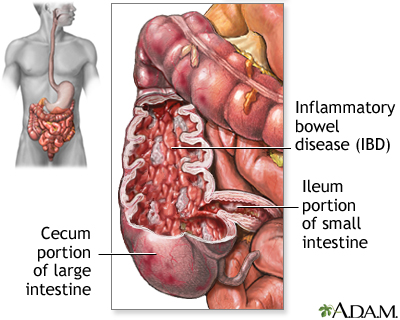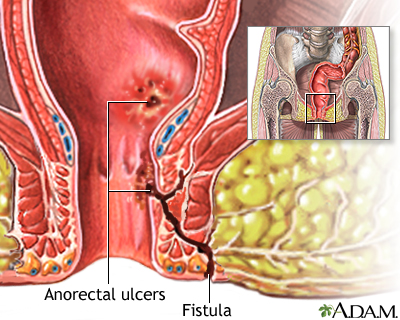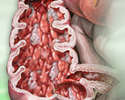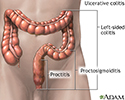Crohn disease
Crohn's disease; Inflammatory bowel disease - Crohn's disease; Regional enteritis; Ileitis; Granulomatous ileocolitis; IBD - Crohn's disease
Crohn disease is a disease where parts of the digestive tract become inflamed.
- It most often involves the lower end of the small intestine and the beginning of the large intestine.
- It may also occur in any part of the digestive system from the mouth to the end of the rectum (anus).
Crohn disease is a form of inflammatory bowel disease (IBD).
Ulcerative colitis is a related condition.
Ulcerative colitis
Ulcerative colitis is a condition in which the lining of the large intestine (colon) and rectum become inflamed. It is a form of inflammatory bowel ...

Causes
The exact cause of Crohn disease is unknown. It occurs when your body's immune system mistakenly attacks and destroys healthy body tissue (autoimmune disorder).
When parts of the digestive tract remain swollen or inflamed, the walls of the intestines become thickened.
Factors that may play a role in Crohn disease include:
- Your genes and family history. (People of Jewish descent are at higher risk.)
- Environmental factors.
- Tendency of your body to over-react to normal bacteria in the intestines.
- Smoking.
Crohn disease may occur at any age. It most often occurs in people between ages 15 to 35.
Symptoms
Symptoms depend on what part of the digestive tract is involved. Symptoms range from mild to severe, and can come and go with periods of flare-ups.
The main symptoms of Crohn disease are:
- Crampy pain in the abdomen (belly area).
- Fever.
- Fatigue.
- Loss of appetite.
- Feeling that you need to pass stools, even though your bowels are already empty. It may involve straining, pain, and cramping.
- Watery diarrhea, which may be bloody.
- Weight loss.
Other symptoms may include:
- Constipation
- Sores or swelling in the eyes
- Draining of pus, mucus, or stools from around the rectum or anus (caused by something called a fistula)
- Joint pain and swelling
- Mouth ulcers
- Rectal bleeding and bloody stools
- Swollen gums
- Tender, red bumps (nodules) under the skin which may turn into skin ulcers
Exams and Tests
A physical exam may show a mass or tenderness in the abdomen, skin rash, swollen joints, or mouth ulcers.
Tests to diagnose Crohn disease include:
- Barium enema or upper GI series
- Colonoscopy or sigmoidoscopy
- CT scan of the abdomen
- Capsule endoscopy
- MRI of the abdomen
- Enteroscopy
A stool culture may be done to rule out other possible causes of the symptoms.
This disease may also alter the results of the following tests:
- Low albumin levels
- High sed rate
- Fecal fat
- Low blood count (hemoglobin and hematocrit)
- Abnormal liver blood tests
- High white blood cell count
Treatment
Tips for managing Crohn disease at home:
DIET AND NUTRITION
You should eat a well-balanced, healthy diet. Include enough calories, protein, and nutrients from a variety of food groups.
No specific diet has been shown to make Crohn symptoms better or worse. Types of food problems may vary from person to person.
Some foods can make diarrhea and gas worse. To help ease symptoms, try:
- Eating small amounts of food throughout the day.
- Drinking lots of water (drink small amounts often throughout the day).
- Avoiding high-fiber foods (bran, beans, nuts, seeds, and popcorn).
- Avoiding fatty, greasy or fried foods and sauces (butter, margarine, and heavy cream).
- Limiting dairy products if you have problems digesting dairy fats. Try low-lactose cheeses, such as Swiss and cheddar, and an enzyme product, such as Lactaid, to help break down lactose.
- Avoiding foods that you know cause gas, such as beans.
Ask your doctor about extra vitamins and minerals you may need, such as:
- Iron supplements (if you are anemic)
- Calcium and vitamin D supplements to help keep your bones strong
- Vitamin B12 to prevent anemia
If you have an ileostomy, you will need to learn:
-
Diet changes
Diet changes
Standard ileostomy - diet; Brooke ileostomy - diet; Continent ileostomy - diet; Abdominal pouch - diet; End ileostomy - diet; Ostomy - diet; Inflamma...
Read Article Now Book Mark Article -
How to change your pouch
How to change your pouch
Standard ileostomy - pouch change; Brooke ileostomy - pouch change; Continent ileostomy - changing; Abdominal pouch changing; End ileostomy - pouch c...
Read Article Now Book Mark Article -
How to care for your stoma
How to care for your stoma
Standard ileostomy - stoma care; Brooke ileostomy - stoma care; Continent ileostomy - stoma care; Abdominal pouch - stoma care; End ileostomy - stoma...
Read Article Now Book Mark Article
STRESS
You may feel worried, embarrassed, or even sad and depressed about having a bowel disease. Other stressful events in your life, such as moving, a job loss, or the loss of a loved one can worsen digestive problems.
Ask your health care provider for tips on how to manage your stress.
MEDICINES
You can take medicine to treat very bad diarrhea. Loperamide (Imodium) can be bought without a prescription. Always talk to your doctor before using these drugs.
Other medicines to help with symptoms include:
- Fiber supplements may help your symptoms. You can buy psyllium powder (Metamucil) or methylcellulose (Citrucel). Ask your doctor before taking these products or laxatives.
- Acetaminophen (Tylenol) for mild pain. Avoid drugs such as aspirin, ibuprofen (Advil, Motrin), or naproxen (Aleve, Naprosyn) which can make your symptoms worse.
Your doctor may also prescribe medicines to help control Crohn disease:
- Aminosalicylates (5-ASAs), medicines that help control mild to moderate symptoms. Some forms of the drug are taken by mouth, and others must be given rectally.
- Corticosteroids, such as prednisone, treat moderate to severe Crohn disease. They may be taken by mouth or inserted into the rectum.
- Medicines that quiet the immune system's reaction.
- Antibiotics to treat abscesses or fistulas.
- Biologic therapy may be used for severe Crohn disease that does not respond to any other types of medicines.
SURGERY
Some people with Crohn disease may need surgery to remove a damaged or diseased part of the intestine. In some cases, the entire large intestine is removed, with or without the rectum.
People who have Crohn disease that does not respond to medicines may need surgery to treat problems such as:
- Bleeding
- Failure to grow (in children)
- Fistulas (abnormal connections between the intestines and another area of the body)
- Infections
- Narrowing of the intestine
Surgeries that may be done include:
-
Ileostomy
Ileostomy
An ileostomy is used to move waste out of the body. This surgery is done when the colon or rectum is not working properly. The word "ileostomy" come...
Read Article Now Book Mark Article -
Removal of part of the large bowel
or
small bowel
Removal of part of the large bowel
Large bowel resection is surgery to remove all or part of your large bowel. This surgery is also called colectomy. The large bowel is also called t...
 ImageRead Article Now Book Mark Article
ImageRead Article Now Book Mark ArticleSmall bowel
Small bowel resection is surgery to remove part or all of your small bowel. It is done when part of your small bowel is blocked or diseased. The sma...
 ImageRead Article Now Book Mark Article
ImageRead Article Now Book Mark Article -
Removal of the large intestine to the rectum
Removal of the large intestine to the r...
Total abdominal colectomy is the removal of the large intestine from the lowest part of the small intestine (ileum) to the rectum. After it is remov...
Read Article Now Book Mark Article -
Removal of the large intestine and most of rectum
Removal of the large intestine and most...
Total proctocolectomy and ileal-anal pouch surgery is the removal of the large intestine and most of the rectum. The surgery is done in one or two s...
Read Article Now Book Mark Article
Support Groups
The Crohn's and Colitis Foundation of America offers support groups throughout the United States.
Outlook (Prognosis)
There is no cure for Crohn disease. The condition is marked by periods of improvement followed by flare-ups of symptoms. Although Crohn disease cannot be cured even with surgery, treatment can offer significant help to most people.
Possible Complications
You have a higher risk for small bowel and colon cancer if you have Crohn disease. At some point, your doctor may recommend tests to screen for colon cancer.
Those with more severe Crohn disease may have these problems:
- Abscess or infection in the intestines
- Anemia, a lack of red blood cells
- Bowel blockage
- Fistulas in the bladder, skin, or vagina
- Slow growth and sexual development in children
- Swelling of the joints
- Lack of important nutrients, such as vitamin B12 and iron
- Problems with maintaining a healthy weight
-
Inflammation of the bile ducts (
primary sclerosing cholangitis
)
Primary sclerosing cholangitis
Sclerosing cholangitis refers to swelling (inflammation), scarring, and destruction of the bile ducts inside and outside of the liver.
 ImageRead Article Now Book Mark Article
ImageRead Article Now Book Mark Article
When to Contact a Medical Professional
Call your health care provider if:
- You have very bad abdominal pain.
- You cannot control your diarrhea with diet changes and drugs.
- You have lost weight, or a child is not gaining weight.
- You have rectal bleeding, drainage, or sores.
- You have a fever that lasts for more than 2 or 3 days, or a fever higher than 100.4°F (38°C) without an illness.
- You have nausea and vomiting that lasts for more than a day.
- You have skin sores that do not heal.
- You have joint pain that prevents you from doing your everyday activities.
- You have side effects from medicines you are taking for your condition.
References
Cheifetz AS. Management of active Crohn disease. JAMA . 2013;309(20):2150-2158. PMID: 23695484 www.ncbi.nlm.nih.gov/pubmed/23695484 .
Fry RD, Mahmoud NN, Maron DJ, Bleier JIS. Colon and rectum. In: Townsend CM Jr, Beauchamp RD, Evers BM, Mattox KL, eds. Sabiston Textbook of Surgery . 19th ed. Philadelphia, PA: Elsevier Saunders; 2012:chap 52.
Lichenstein GR. Inflammatory bowel disease. In: Goldman L, Schafer AI, eds. Goldman's Cecil Medicine . 25th ed. Philadelphia, PA: Elsevier Saunders; 2016:chap 141.
Lichtenstein GR, Hanauer SB, Sandborn WJ; Practice Parameters Committee of American College of Gastroenterology. Management of Crohn's disease in adults. Am J Gastroenterol . 2009;104(2):465-483. PMID: 19174807 www.ncbi.nlm.nih.gov/pubmed/19174807 .
Sandborn WJ. Crohn's disease evaluation and treatment: clinical decision tool. Gastroenterology . 2014;147(3):702-705. PMID: 25046160 www.ncbi.nlm.nih.gov/pubmed/25046160 .
Sands BE, Siegel CA. Crohn's disease. In: Feldman M, Friedman LS, Brandt LJ, eds. Sleisenger and Fordtran's Gastrointestinal and Liver Disease. 10th ed. Philadelphia, PA: Elsevier Saunders; 2016:chap 115.
Terdiman JP, Gruss CB, Heidelbaugh JJ, Sultan S, Falck-Ytter YT; AGA Institute Clinical Practice and Quality Management Committee. American Gastroenterological Association Institute guideline on the use of thiopurines, methotrexate, and anti-TNF-a biologic drugs for the induction and maintenance of remission in inflammatory Crohn's disease. Gastroenterology . 2013;145(6):1459-1463. PMID: 24267474 www.ncbi.nlm.nih.gov/pubmed/24267474 .
-
Crohn disease
Animation
-
Digestive system - illustration
The esophagus, stomach, large and small intestine, aided by the liver, gallbladder and pancreas convert the nutritive components of food into energy and break down the non-nutritive components into waste to be excreted.
Digestive system
illustration
-
Crohn disease, X-ray - illustration
This lower abdominal x-ray shows narrowing (stenosis) of the end of the small intestine (ileum), caused by Crohn disease. Crohn disease typically affects the small intestine, whereas ulcerative colitis typically affects the large intestine. A solution containing a dye (barium), was swallowed by the patient. When it passed into the small intestines, this x-ray was taken (lower GI series).
Crohn disease, X-ray
illustration
-
Inflammatory bowel disease - illustration
Crohn disease, also called regional enteritis, is a chronic inflammation of the intestines which is usually confined to the terminal portion of the small intestine, the ileum. Ulcerative colitis is a similar inflammation of the colon, or large intestine. These and other IBDs (inflammatory bowel disease) have been linked with an increased risk of colorectal cancer.
Inflammatory bowel disease
illustration
-
Anorectal fistulas - illustration
Crohn disease is an inflammation of the intestines caused by immune response to an infection. The lining of the intestine may ulcerate and form channels of infection, called fistulas. Fistulas tunnel from the area of ulceration, creating a hole which may continue until it reaches the surface of the organ, or the surface of nearby skin. These holes typically spread the infection that creates them, and life-threatening conditions such as peritonitis (inflammation of the lining of the abdomen) may occur.
Anorectal fistulas
illustration
-
Crohn disease - affected areas - illustration
The inflammation of Crohn disease is nearly always found in the ileocecal region. The ileocecal region consists of the last few inches of the small intestine (the ileum), which moves digesting food to the beginning portion of the large intestine (the cecum). However, Crohn disease can occur anywhere along the digestive tract.
Crohn disease - affected areas
illustration
-
Ulcerative colitis - illustration
Ulcerative colitis is categorized according to location: Proctitis involves only the rectumProctosigmoiditis affects the rectum and sigmoid colonLeft-sided colitis encompasses the entire left side of the large intestinePancolitis inflames the entire colon Proctitis involves only the rectum Proctosigmoiditis affects the rectum and sigmoid colon Left-sided colitis encompasses the entire left side of the large intestine Pancolitis inflames the entire colon
Ulcerative colitis
illustration
-
Inflammatory bowel disease
Presentation
-
Digestive system - illustration
The esophagus, stomach, large and small intestine, aided by the liver, gallbladder and pancreas convert the nutritive components of food into energy and break down the non-nutritive components into waste to be excreted.
Digestive system
illustration
-
Crohn disease, X-ray - illustration
This lower abdominal x-ray shows narrowing (stenosis) of the end of the small intestine (ileum), caused by Crohn disease. Crohn disease typically affects the small intestine, whereas ulcerative colitis typically affects the large intestine. A solution containing a dye (barium), was swallowed by the patient. When it passed into the small intestines, this x-ray was taken (lower GI series).
Crohn disease, X-ray
illustration
-
Inflammatory bowel disease - illustration
Crohn disease, also called regional enteritis, is a chronic inflammation of the intestines which is usually confined to the terminal portion of the small intestine, the ileum. Ulcerative colitis is a similar inflammation of the colon, or large intestine. These and other IBDs (inflammatory bowel disease) have been linked with an increased risk of colorectal cancer.
Inflammatory bowel disease
illustration
-
Anorectal fistulas - illustration
Crohn disease is an inflammation of the intestines caused by immune response to an infection. The lining of the intestine may ulcerate and form channels of infection, called fistulas. Fistulas tunnel from the area of ulceration, creating a hole which may continue until it reaches the surface of the organ, or the surface of nearby skin. These holes typically spread the infection that creates them, and life-threatening conditions such as peritonitis (inflammation of the lining of the abdomen) may occur.
Anorectal fistulas
illustration
-
Crohn disease - affected areas - illustration
The inflammation of Crohn disease is nearly always found in the ileocecal region. The ileocecal region consists of the last few inches of the small intestine (the ileum), which moves digesting food to the beginning portion of the large intestine (the cecum). However, Crohn disease can occur anywhere along the digestive tract.
Crohn disease - affected areas
illustration
-
Ulcerative colitis - illustration
Ulcerative colitis is categorized according to location: Proctitis involves only the rectumProctosigmoiditis affects the rectum and sigmoid colonLeft-sided colitis encompasses the entire left side of the large intestinePancolitis inflames the entire colon Proctitis involves only the rectum Proctosigmoiditis affects the rectum and sigmoid colon Left-sided colitis encompasses the entire left side of the large intestine Pancolitis inflames the entire colon
Ulcerative colitis
illustration
-
Inflammatory bowel disease
Presentation
-
Crohn disease
(In-Depth)
-
Crohn disease
(Alt. Medicine)
Review Date: 1/28/2016
Reviewed By: Subodh K. Lal, MD, gastroenterologist with Gastrointestinal Specialists of Georgia, Austell, GA. Review provided by VeriMed Healthcare Network. Also reviewed by David Zieve, MD, MHA, Isla Ogilvie, PhD, and the A.D.A.M. Editorial team.















